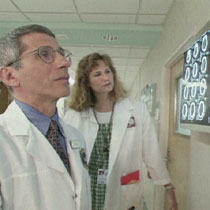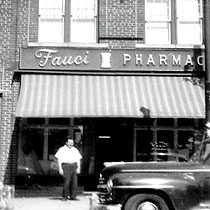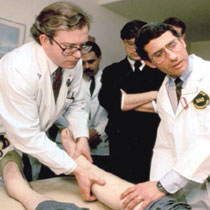2007年VOA标准英语-HIV/AIDS Advocate Says Global Community Must Sh(在线收听)
Washington
20 June 2007
Welcome to American Profiles, VOA's weekly spotlight on notable Americans who have made a difference in how we think, live and act. Today: Anthony Fauci, a medical researcher whose tireless energy and drive for excellence have been crucial to the fight against HIV/AIDS and other infectious diseases.
 |
| Anthony Fauci |
Since 1984 Fauci has directed the federally funded National Institute of Allergy and Infectious Diseases, which has a staff of 1,300 and an annual budget of $4.3 billion.
He explains the agency’s mission. "Our mission and mandate is to apply the science we do for health in this country, but well beyond that for global health, so we have become extremely involved in global health issues at the same time as our world has evolved to be much more of a global community."
Fauci seems very much a man on a mission. During a typical 15-hour workday he attends back-to-back meetings, writes and reviews scientific articles, and confers with researchers on the National Institutes of Health campus.
 |
| Fauci's childhood home was located above his father's drug store |
Fauci was good at science, but also loved sports and played basketball for his high school team. He credits his Jesuit-led Christian education for teaching him the value of public service. "It was almost understood that if you wanted to be the best person you possibly could be, the important thing in life is what you do for others."
Fauci graduated from medical school at the height of the Vietnam War in the late 1960s. Rather than be drafted into the military, he requested an assignment to the Public Health Service. In 1968 he started working at the National Institute of Allergy and Infectious Diseases.
Then a mysterious medical event transformed his life. Dr. Fauci describes it. "And that is in 1981, at a time when I had already been establishing myself as a clinical and basic investigator of some note, these strange cases of gay men reported in Los Angeles, first, and then in New York, Los Angeles and San Francisco with these unusual opportunistic diseases."
 |
| Fauci (right) exanmining an AIDS patient in 1987 |
Fauci calls this time the "dark days" of AIDS. He became the target of activist criticism, was burned in effigy and blamed for the government's inaction getting experimental drugs to the hands of people, desperate for treatment. Recalling a protest staged outside his office, he says that instead of asking police to arrest the disruptive group, he invited the leaders upstairs to talk.
"And I listened to what they were saying and [putting] aside the theater, the smoke bombs and the demonstrations and all the things that they did, and listened to the kinds of things the activists were saying and it actually made perfect sense."
Now that the AIDS virus had been identified, Fauci's team could start looking for a cure. But it was not until the mid-1990s before they discovered a combination that made AIDS a manageable disease. However, he says, for those people in developing countries, these drugs are in short supply and unaffordable.
"There is a whole other world out there besides us here in the United States and there are millions and millions of preventable deaths."
Following a 2003 trip to Uganda, Fauci took his battle against HIV/AIDS to the White House. Later that year, Congress approved the president's $15 billion Emergency Plan for AIDS Relief.
Now 66 years old, Anthony Fauci is still tireless in his dedication to saving lives. And he does so, he says, as a scientist driven by a life-long quest for knowledge and excellence.